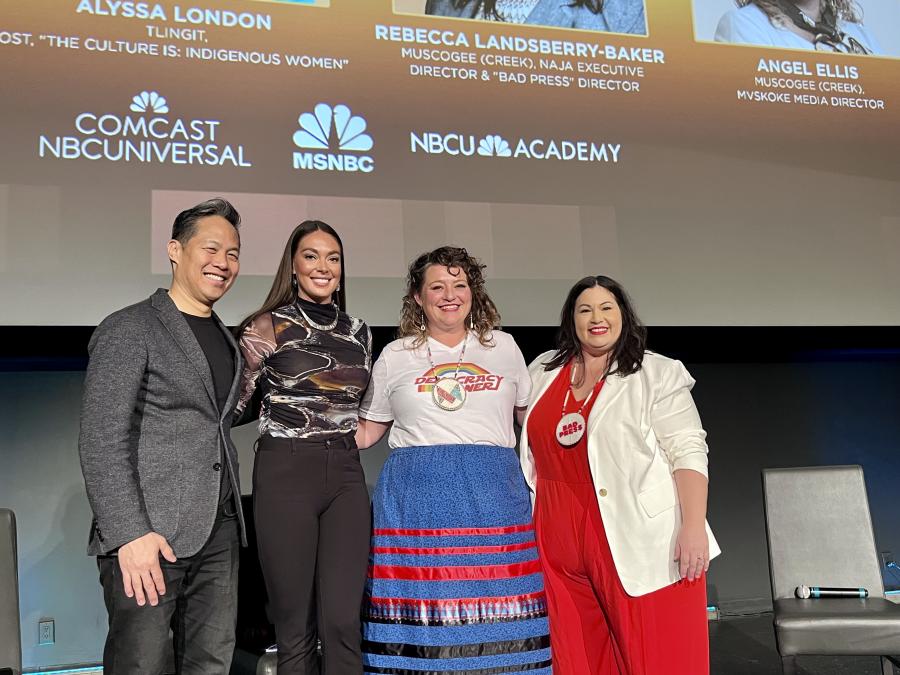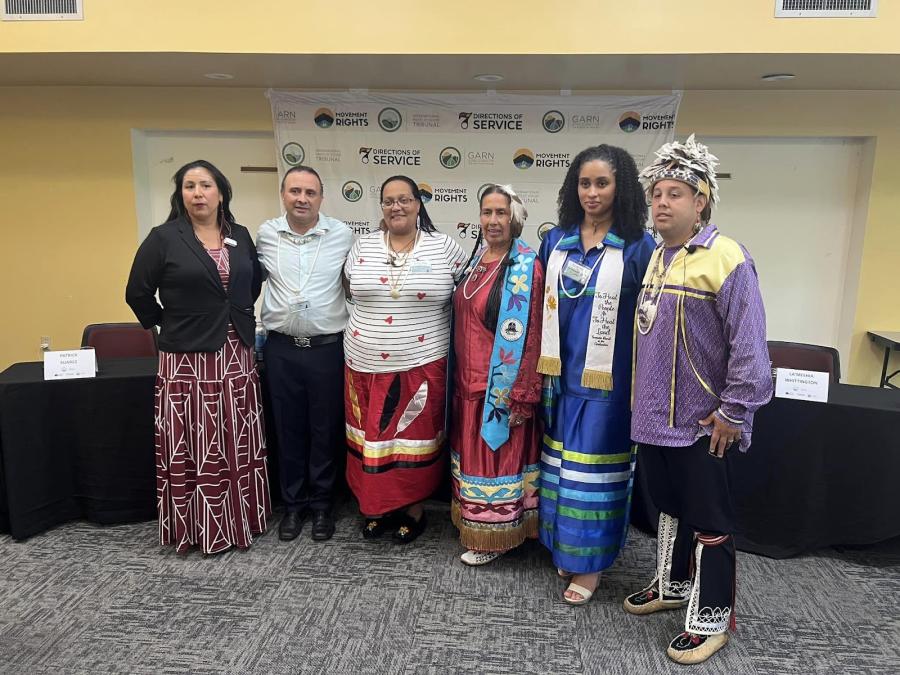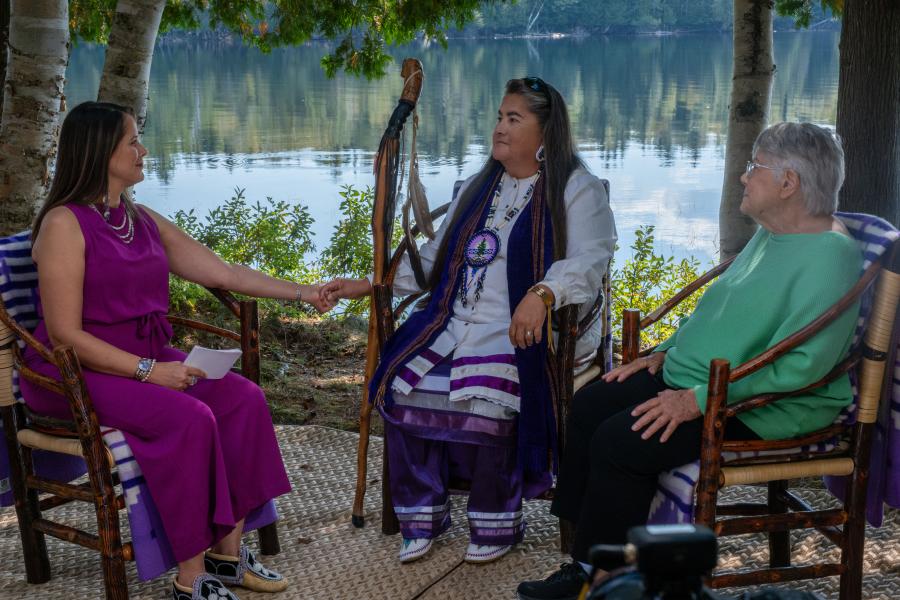
By Saché Primeaux-Shaw (Ponca, Yankton-Dakota, Seminole and Chickasaw Freedman)
My fourth great-grandmother Betty Shaw, my third great-grandfather John, and his siblings were freed near Honey Grove, Texas, on June 19, 1865. My other set of Texas-based ancestors, my fourth great-grandparents Henry and Jane Anderson, my third great-grandmother Maria and her siblings were also among these formerly enslaved African-Americans who would leave their former plantations where they were held in bondage to go West. They were all freed on Juneteenth, also known as Jubilee Day.
John and Maria got married in Fannin County, Texas, and started their family there and migrated up to Indian Territory by 1900. They followed a group of formerly enslaved Black people called the Exodusters. The Exodusters Movement of 1879 encouraged a large migration of formerly enslaved people from the Deep South to states out West including Kansas, Colorado, and present-day Oklahoma. John’s mother accompanied them to the Chickasaw Territory where another group of people of African descent resided, the Chickasaw Freedmen.
Many Black Oklahomans who are descendants of formerly enslaved people can trace their lines back to Texas where the Juneteenth holiday originated. On a sweltering summer day in 1865, Union General Gordon Granger traveled to Galveston to give the news that they were free to enslaved people who were unaware of the Emancipation Proclamation that the late U.S. President Abraham Lincoln signed two years earlier, in 1863. The response was not immediate, some stayed on plantations that they were born on to work. They would not find quick work as newly freed people. Then there were some who did not know where to go and were enticed by their former enslavers to stay and work for pennies. Some families, such as my Shaw and Anderson lines, would leave Texas nearly two decades later as they established their homes as free people away from the plantation. Throughout the 1900 census records, one will find many Black Oklahoman families that have Texas ties as a result.
Juneteenth, while not an official Oklahoma holiday [at the time of writing this article], is celebrated throughout the state and even across the United States. Here, in Oklahoma City, on the northeast side which is the predominantly Black quadrant, and Tulsa’s Historic Greenwood District are the hosts of the largest celebrations in the state. Smaller communities with significant Black populations such as Ardmore and McAlester in Oklahoma, as well as some of the remaining historic Black towns, such as Boley and Langston, also host celebrations every year. The city of Norman under Mayor Breea Clark designated the day as an official city holiday there. They will be hosting their first Juneteenth celebration this year and this is significant considering Norman was a former Sundown town. Sundown towns were created to be all-white towns and communities that had strict rules for those traveling through that were non-white. One popular rule was that if you were Black, you had to be out of that town by sundown. These celebrations are a space for reflection for many descendants of the formerly enslaved from Texas and across the South. While Jubilee Day is one of my favorite holidays and a cause for celebration for me personally, it is important to note that not all of my ancestors were free on this day.
Photo: Freedmen's dance at Fort Gibson during Dawes enrollment. Photo courtesy of: Oklahoma Historical Society Archives.
For many outside of Oklahoma, the history of the Freedmen of the Five Tribes (Cherokee, Choctaw, Mvskoke Creek, Chickasaw, and Seminole) is not widely known. The Five “Civilized” Tribes were formerly from the southeastern part of the country. One reason why they are referred to as “civilized” is because of their practice of slavery by some of their members. These Tribes, along with hundreds of others, would be forcibly deported to different parts of the country including the carved out Indian Territory. This land belonged to the Osage and Wichita people. However, these Tribes were removed to reservations as well, the Wichita to the Southwestern part of Oklahoma state and the Osage to the North. These events would be known as the Trail of Tears. Thousands would lose their lives during these forced death marches. Within the Five Tribes, the Freedmen also made this journey. All of these Tribes fought during the Civil War and some chose the Confederate side. As a matter of fact, the last Confederate general to surrender was Stand Watie of the Cherokee.
Not all of us were free by 1865. Two of my paternal lines are the Smith line from Seminole County and McCain line from Love County. My Smith family were Seminole Freedmen, many who fought with the Seminoles during the first two Seminole wars. One ancestor, in particular, Abraham who was a member of the Gullah Peoples from South Carolina, was a leader of one of the biggest Black Seminole villages in present-day Florida outside of Orlando named Pilaklikaha, which was founded in 1813. All of the Freedmen of the Five Tribes were not free until 1866. The Treaties of 1866 with each Tribe ensured this and granted them citizenship within the Tribes with the exception of the Chickasaw. The Chickasaw did not adopt their formerly enslaved people within the time frame they were given. My Chickasaw Freedmen ancestors were my third great-grandfather Irwin McCain and my second great-grandmother Zylphia McCain Bowler. My Seminole Freedmen ancestors were Abraham and Pocey Pasa, my third great-grandparents and my second great-grandfather Emmerson Smith.
Photo: Author's second great-grandma Zylphia McCain Bowler (Chickasaw Freedmen descendant), great-aunt Earnestine Bowler and cousin Marilyn in August 1956 in Okfuskee County, Oklahoma.
Today, the fight to be recognized within these Tribes continues. The Cherokee Freedmen had a long fight to be reinstated and that was finally realized in 2017. One of my own Tribal nations, the Seminole Nation, expelled my family along with other Freedmen descendants in the late 1990s. They were reinstated in 2003 but with limited benefits. That is a fight within itself. It will always be an ugly stain on our nation along with the others. The Mvskoke Creek, Chickasaw, and Choctaw Nations are the remaining three that have not reinstated their Freedmen members. It needs to always be noted that there was a group of formerly enslaved people in present-day Oklahoma that were not free by June 19th, 1865. I always provide people with those resources to not only educate themselves but others across the country.
Today, my family celebrates Jubilee Day and we also pay homage to our Freedmen ancestors who were not free on this day but on the day that our Treaties of 1866 were signed. It is a complex heritage but one with a shared legacy of being formerly enslaved. One of being both Black and Indigenous and one of being within a sovereign nation where they were once second-class citizens. It’s one that I carry with me and one that I will continue to shed light on. That is why my genealogical journey is so important to me and I am determined to be my family’s griot.
-- Saché Primeaux-Shaw is a member of the Ponca Tribe of Oklahoma and a Seminole and Chickasaw Freedmen descendant. She is a native of Oklahoma City and her family has been in Oklahoma for nearly seven generations. She is an activist for various issues including racial equity, environmental equality, and equal education in Black, Brown, and Indigenous communities. She is active in her Tribe with the gaming and economic development sector. She is a genealogist and has helped many find their family ties. She is also a member of Alpha Kappa Alpha Sorority which is the oldest African American Sorority in the country. Primeaux-Shaw is a past president of the Young Democrats of Oklahoma where her mission was to get more young people from marginalized communities involved in the political process.
Top image: Juneteenth Flag



